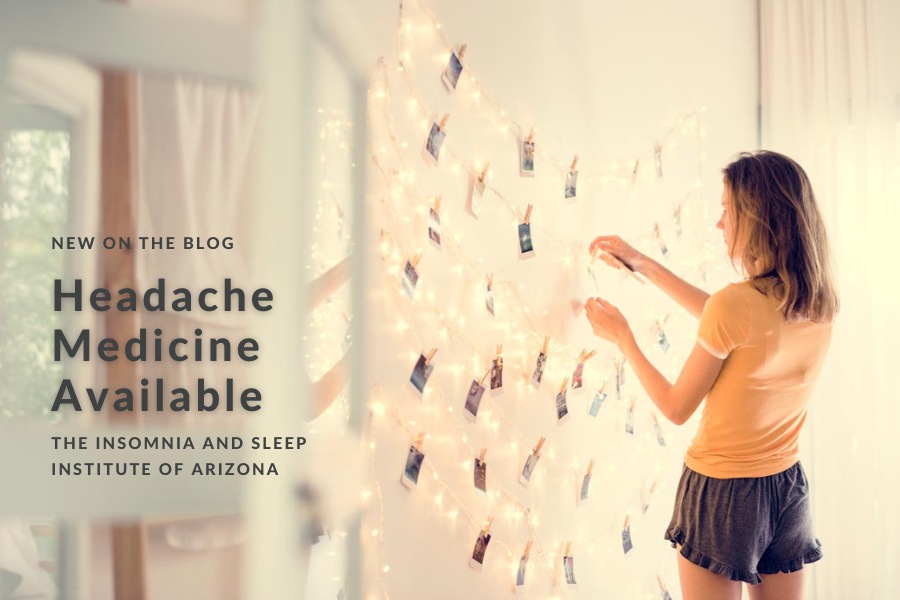A Cleveland Clinic blog recently listed a variety of sleep disorders as one of the primary reasons you may be waking up with a headache. Of course, teeth grinding and hangovers (as per the Clinic’s article) are the most common causes of waking up with an aching head, but if those can be ruled out then you might want to look at what’s happening while you’re asleep. At The Insomnia and Sleep Institute of Arizona, Dr. Vimala Sravanthi Vajjala is a neurologist who specializes in headaches, facial pain, and epilepsy. This quadruple board-certified sleep expert is qualitied in Neurology, Clinical Neurophysiology, Epilepsy, and Headache Medicine. If you routinely wake up with headaches, the first step is scheduling a consultation with a sleep expert who can diagnose conditions and inform testing and treatment.
According to the Cleveland Clinic, when it comes to waking up with a headache “know that sleep problems are often part of the puzzle.” There are different kinds of headaches, with certain types of headaches being more typical in the morning. Migraines can occur at this time of day and present as an intense throbbing in a singular location of the head. This pain is usually very intense and may be accompanied by dizziness and nausea. There are also tension-type headaches, which feel like the head is being squeezed. They present with more consistent pressure and affect the entire head. Pain can be mild to intense.
You may also experience cluster headaches, which usually affect one side of the head and cause severe pain. The pain retreats quickly, but comes back severely. Cluster headaches can last anywhere from 15 minutes to four hours on average. Hypnic headaches are rarer, but are dubbed “alarm clock” headaches because they are most common in the morning. They happen when you’re asleep and are the cause of the patient awakening. These headaches can occur any time you are asleep, and might happen once per night or several times. Identifying the kind of headache you’re experiencing in the morning is crucial in order to get a diagnosis and treatment, and is something Dr. Sravanthi Vajjala can help you with.
Most Common Sleep Disorders Associated with Headaches
There is a strong association between sleep disorders and headaches. For starters, sleep deprivation—such as what occurs in those with insomnia—simply make you more likely to have tension headaches. It’s a vicious cycle. Insomnia can cause these headaches, which in turn make it tough to sleep and exacerbate chronic insomnia. A lack of sleep from insomnia (or any cause) can also amplify or kick-start many other kinds of headaches. Any time we aren’t getting the sleep we need, pain gets amplified. What might be a tolerable headache is suddenly amped up when you’re also dealing with insomnia.
However, even if you’re getting enough sleep and don’t have insomnia, headaches such as migraines and cluster headaches can occur while you’re asleep—causing insomnia. Another common sleep disorder associated with headaches is sleep apnea. When you have sleep apnea, like OSA, you stop breathing for short periods while asleep. Snoring is the most common sign of sleep apnea, but “sleep apnea headaches” are also prevalent. According to the Cleveland Clinic, “We think more than half of the people with sleep apnea have headaches. The classic scenario is that a person wakes up with a headache each day, which goes away within four hours.”
Those with sleep apnea headaches often describe the pain as “pressing” and occurring on both sides of the head. They are not the same as migraines, which usually pulse on just one side of the head. The good news is that when sleep disorders are treated, the headaches associated with them are also “treated” and are minimized or disappear.
Headache Medicine for Sleep Disorders
If you have headaches due to a sleep disorder, help is available. Dr. Vajjala evaluates patients for headaches and other conditions and oversees the dedicated botulinum toxin clinic that treats facial pain and chronic migraines. She works with a variety of FDA-approved treatments, such as Botox and Xeomin. As one of just 750 board-certified headache specialists in the country, and board-certified in Headache Medicine by the United Council of Neurological Subspecialities (UCNS), she specializes in treating migraines and epilepsy in women, cluster headaches, posttraumatic headaches, and much more. Her procedure focus is on injections including botulinum toxin and nerve blockers, as well as trigger point injections. To find out more about the relation between headaches and sleep disorders and to get your headache medicine, contact The Insomnia and Sleep Institute today by calling the office or filling out the online contact form.





